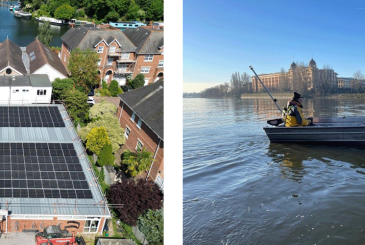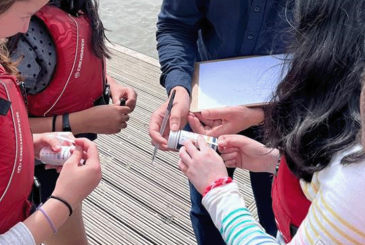With the Paralympics firmly on the horizon, Rosie Oates meets a junior rower and explores how clubs can welcome more adaptive rowers
With the Olympic and Paralympic Games finally going ahead, it is the perfect time to reflect on the rowing talent within our country. Despite the year-long delay, our Paralympic team looks more potent than ever. Since rowing was included in the Paralympics in Beijing in 2008, GB has been dominant, and the rowers have continued to go from strength to strength.
Yet if these successes are to carry on, then rowing as an inclusive and adaptive sport needs to be accessible countrywide, especially when encouraging young junior talent to get out on the water. In some areas, the groundwork has already been laid. For example, since 2013, there has been a Para-rowing single sculls trophy at Henley Women’s Regatta (HWR) – the Grosvenor Cup – however, it does not always get raced due to lack of entries which begs the question: how can clubs and competitions encourage more adaptive rowing? Incidentally, Para-rowing refers only to those rowers who are classified while adaptive refers to everyone.
One of the eminent adaptive programmes in the UK is at Marlow Rowing Club, spearheaded by Bruce Lynn, who became the coordinator of the adaptive rowing programme there in 2014. It was the Marlow sculler Georgia Walker who took home the most recent win at HWR in the PR3 category, which is an indicator of the standard of the coaching and talent at Marlow.
Bruce put me in contact with one of his juniors – Amelia – with the view of getting a better understanding of what it’s like to row in an adaptive boat.
Pictured above, Amelia started rowing with Marlow recently, after a brain haemorrhage in January 2020 left her unable to continue rowing with her school. However, she was determined to get back into the boat and is now part of a squad of 10-15 rowers who row predominantly in pairs and fours. When asked about how rowing makes her feel, she replies with one emotive word: “blissful”.

Her mother, Suzi, says it has “given her a purpose… she’s always smiling when she’s in a boat”. Amelia was endlessly complimentary about the supportive and encouraging atmosphere, which was backed up further by her mum, who says that she “barely has time to stop the car because Amelia is so keen to get out on the water”.
This reflects the standard and quality of the coaching team, which, as Suzi and Amelia describe, went above and beyond to make sure Amelia could row.
But it’s not all glowing reviews, at least not when it comes to the number of competitions available for adaptive rowing. When we discuss what she would like to see improve most in adaptive rowing in the UK, the first thing Amelia says is that schools need to be more involved and things need to be more inclusive.
Reflecting on Amelia’s journey from an able-bodied rower to where she is now, Suzi adds: “The whole 18 months has been an eye-opener as to how separate the adaptive rowing community is from the rest of the rowing world.”
Across the country, there are very few adaptive rowing programmes and even fewer races.
Though there is the singles adaptive rowing category at Henley Women’s, Suzi and Amelia highlights the fact that this does not represent what they experience at club level.
Not only does the volume of races available to adaptive rowers need to increase, but the type of boats included in these races also needs to represent the demand.
Yet ever the optimist, Amelia sums it up perfectly when I ask her what she wants to achieve by this time next year, saying: “I want to get the numbers up, and have more competitions!”
For any club that is considering introducing an adaptive group, Bruce says: “Supporting adaptive and Para-rowing isn’t trivial, but it is much easier than most clubs anticipate.
“You will not be inundated with new athletes – it takes a while for the word to get out and usually they join slowly one at a time. You won’t have major accessibility issues – these individuals are used to, and adept at, handling situations that their disability makes difficult. Furthermore, you will have lots of support.
“Disability empowerment is supported by many charities who are keen to help, and many veteran rowers really embrace support rowing/coaching as a way to enjoy the sport.”
Marlow is not the only club with a successful adaptive rowing programme. There is a strong programme at Guildford while Stratford-upon-Avon Rowing Club won the first Parasport club of the year award in 2020.
Parasport is a recent venture, endorsed and developed by ParalympicsGB, to encourage involvement in all sports across the country. This is an impressive accolade for Stratford to win and is a step in the right direction to getting the word out about adaptive rowing and will hopefully encourage more people to join.
Inclusivity is the word of the day here. The most important aspect to improve and encourage is to get the message out there for more people to start adaptive rowing and get events included at competitions. But this is no easy task. As Amelia says, having greater representation in schools and encouraging students who could benefit from the adaptive rowing programmes to get out on the water will create a new generation of athletes. Giving the rowers a chance to race is even more critical because, for many, racing is one of the best parts of rowing – so everyone should get an opportunity to experience it.
However, starting an adaptive section at your club is a step in the right direction.
Jo Atkinson, Community and Adaptive Rowing Support Manager at British Rowing, says: “There are a growing number of clubs that offer adaptive rowing, but they often don’t publicise it, either by accident or design.
“Adaptive rowing is a great way to get out of the house, make new friends, enjoy being outdoors on the water and be part of a supportive community, it’s not all about the racing!
“We need to raise the numbers of clubs that offer adaptive rowing and support the ones that do – and British Rowing has a strategy to do this. I am more than happy to talk to anyone who wants to start adaptive rowing, either as a rower, a coach or a club.”
So, as Para-rowers prepare to race at the Paralympics, there are sure to be plenty of inspirational moments on the water at Tokyo. Creating more programmes like the fantastic ones at Stratford and Marlow will help embed adaptive rowing as a part of British rowing culture.
If you’d like to find out more about adaptive rowing, then be sure to check out British Rowing’s new Adaptive Club Guide. You can also contact Jo for advice at [email protected]










